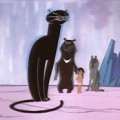Now you must be content to skip ten or eleven whole years, and only guess at all the wonderful life that Mowgli led among the wolves, because if it were written out it would fill ever so many books. He grew up with the cubs, though they, of course, were grown wolves almost before he was a child. And Father Wolf taught him his business, and the meaning of things in the jungle, till every rustle in the grass, every breath of the warm night air, every note of the owls above his head, every scratch of a bat's claws as it roosted for a while in a tree, and every splash of every little fish jumping in a pool meant just as much to him as the work of his office means to a business man. When he was not learning he sat out in the sun and slept, and ate and went to sleep again. When he felt dirty or hot, he swam in the forest pools; and when he wanted honey (Baloo told him that honey and nuts were just as pleasant to eat as raw meat) he climbed up for it, and that Bagheera showed him how to do. Bagheera would lie out on a branch and call, "Come along, Little Brother," and at first Mowgli would cling like the sloth, but afterward he would fling himself through the branches almost as boldly as the gray ape. He took his place at the Council Rock, too, when the Pack met, and there he discovered that if he stared hard at any wolf, the wolf would be forced to drop his eyes, so he used to stare for fun. At other times he would pick out the long thorns out of the pads of his friends. The wolves suffer terribly from thorns and burs in their coats. He would go down the hillside into the cultivated lands by night, and look very curiously at the villagers in their huts, but he had a mistrust of men because Bagheera showed him a square box with a drop gate so cunningly hidden in the jungle that he nearly walked into it, and told him that it was a trap.
He loved better than anything else to go with Bagheera into the dark warm heart of the forest, to sleep all through the drowsy day, and at night see how Bagheera did his killing.
Bagheera killed right and left as he felt hungry, and so did Mowgli-with one exception. As soon as he was old enough to understand things, Bagheera told him that he must never touch cattle because he had been bought into the Pack at the price of a bull's life. "All the jungle is thine," said Bagheera, "and thou canst kill everything that thou art strong enough to kill; but for the sake of the bull that bought thee, thou must never kill or eat any cattle young or old. That is the Law of the Jungle." Mowgli obeyed faithfully.
And he grew and grew strong as a boy must grow who does not know that he is learning any lessons, and who has nothing in the world to think of except things to eat.
Mother Wolf told him once or twice that Shere Khan was not a creature to be trusted, and that some day he must kill Shere Khan.
But though a young wolf would have remembered that advice every hour, Mowgli forgot it because he was only a boy-though he would have called himself a wolf if he had been able to speak in any human tongue.
Shere Khan was always crossing his path in the jungle, for as Akela grew older and feebler, the lame tiger had come to be great friends with the younger wolves of the Pack, who followed him for scraps, a thing Akela would never have allowed if he had dared to push his authority to the proper bounds. Then Shere Khan would flatter them and wonder that such fine hunters were content to be led by a dying wolf and a man's cub. "They tell me," Shere Khan would say, "that at Council ye dare not look him between the eyes." And the young wolves would growl and bristle.
Bagheera, who had eyes and ears everywhere, knew something of this, and once or twice he told Mowgli in so many words that Shere Khan would kill him some day. Mowgli would laugh and answer: "I have the Pack and I have thee; and Baloo, though he is so lazy, might strike a blow or two for my sake. Why should I be afraid?"

